Martin Edwards's Blog, page 62
February 23, 2022
A Medawar Medley
I first met Tony Medawar way back in 1990 when we both attended the London Bouchercon and both took part in a Mastermind quiz. We've been friends ever since. Tony was particularly busy last year and this post seeks to round up some of his achievements. In addition to being Director of the International Agatha Christie Festival in Torquay - a very enjoyable event which I was delighted to participate in, and well worth keeping in mind for this September - he continued his researches into Golden Age fiction, while a number of books published by HarperCollins featured his introductions.
As a long-time Anthony Berkeley fan, I was glad to see the reappearance of The Wychford Poisoning Case and The Silk Stocking Murders, two novels from the 1920s which feature Roger Sheringham. Tony has also superintended the publication of The Wintringham Mystery, which was the original title of the story later published under the pen-name A.Monmouth Platts as Cicely Disappears. This is an exceptionally rare book. I was loaned a pristine, dust-jacketed copy by a member of the author's family (and looked after it very carefully, believe me, before sending it back) and reviewed it on this blog a few years ago. It's fair to say that I don't rank it anything like as highly as the Sheringham novels. But now there is an affordable paperback edition, fans can judge for themselves.
Tony has also edited the fourth anthology of stories in his Bodies from the Library series. Bodies from the Library 4 may not have an unexpected title, but it contains some genuine rarities that will make the mouths of many a Golden Age fan water. There are, for instance, stories by both Edmund Crispin and Ngaio Marsh that have never been published before.
The other ingredients form quite a mix. There are a couple of radio plays and a sequence of six short mysteries by authors including Peter Cheyney which first appeared in the Sunday Dispatch. The highlight, and one which I think will make this book a must-buy for some traditional mystery lovers is a novella by Christianna Brand, 'Shadowed Sunlight', which has again not been available until now. My own favourite is Crispin's 'Child's Play', a dark and uncharacteristic but memorable story. It doesn't feature Gervase Fen, and maybe that was why it never saw the light of day in Crispin's lifetime, but I'm extremely surprised he seems not to have managed to get it published.
The Village - 2004 film review
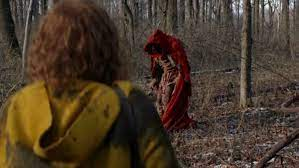
The Village is a film written and directed by M. Night Shyamalan dating back to 2004. When it was first released, it did well at the box office but caused some controversy. This was because Shyamalan had made his name with horror movies that boasted a spectacular final twist and there was a feeling among critics such as Roger Ebert that this time the 'twist' was a dismal let-down. In recent years, there's been some re-evaluation of the movie and I go along with the view that the negative reaction was more about the critics' expectations than the quality of the film.
Because there is indeed a major twist - arguably, a double twist - in this film, I need to express myself cryptically if I'm to avoid spoiling it. And I do want to avoid spoilers because this is a film worth watching - and perhaps, like Midsommar, worth watching again once you know what the director was trying to do.
The village of the title is in Pennsylvania, and it's home to a small and very isolated community. Their dress, way of talking and customs are all highly traditional. This isn't an Amish community, but it has something of the old-world feel of Amish life so memorably presented in the Harrison Ford film Witness. The Chief Elder is Edward Walker, played by that fine actor William Hurt and he has a beautiful blind daughter, Ivy Elizabeth, played by Bryce Dallas Howard, who falls for Lucius Hunt (Joaquin Phoenix), son of Alice Hunt (Sigourney Weaver). From the names I've mentioned, you can see that it's a stellar cast, supported by Adrien Brody, who plays Noah, a disturbed young man who fancies Ivy.
The village is surrounded by Covington Woods and there's a great deal of fear about mysterious creatures believed to live in the woods. The creatures wear red garments and red is a feared colour; a sort of mustardy yellow is a 'safe' colour. There are watchtowers and brightly lit lanterns, all part of the scheme to keep the creatures - said to have a 'truce' with the villagers at the moment - at bay. The Elders have their secrets, some of which appear to be locked away in mysterious boxes. What is going on?
I enjoyed this film and although it didn't develop in the way I expected, I think that Shyamalan does a very good job in entertaining the viewer, so long as one doesn't allow oneself to be swayed by preconceived ideas.
February 22, 2022
Music of the Night
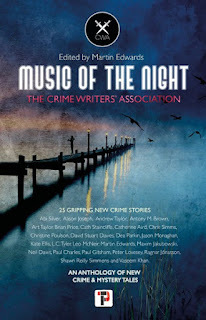
Today sees the official publication of Music of the Night, the latest anthology of the Crime Writers' Association. The publishers, Flame Tree Press, have made a lovely job of production of the book. I've been editing the CWA anthologies since the mid-90s and I continue to enjoy the privilege of being the first person to receive so many wonderful stories. As I've said before, the only regret is that there is never space for all of them. However, the 25 that I did manage to fit into this book offer a very varied mix and there have already been some wonderful reactions from a wide range of bloggers who kindly took part on a blog tour organised by Flame Tree.
The contributors range from Diamond Dagger winners (four of them) to authors who have never previously featured in a CWA anthology (nine people in all). The range of approaches to the linking theme of music is, I think, utterly fascinating.
To whet your appetite, here is a list of the stories:
Abi Silver – Be Prepared
Alison Joseph – A Sharp Thorn
Andrew Taylor – Wrong Notes
Antony M Brown – The Melody of Murder
Art Taylor – Love Me or Leave Me
Brian Price – The Scent of an Ending
Cath Staincliffe – Mix Tape
Catherine Aird – The Last Green Bottle
Chris Simms - Taxi
Christine Poulson – Some Other Dracula
David Stuart Davies – Violin CE
Dea Parkin – The Sound and the Fury
Jason Monaghan – A Vulture Sang in Berkeley Square
Kate Ellis – Not a Note
L C Tyler – His Greatest Hit
Leo McNeir – Requiem
Martin Edwards – The Crazy Cries of Love
Maxim Jakubowski – Waiting for Cornelia
Neil Daws – The Watch Room
Paul Charles – The Ghosts of Peace
Paul Gitsham – No More I Love Yous
Peter Lovesey – And the Band Played On
Ragnar Jonasson - 4x3
Shawn Reilly Simmons – A Death in Four Parts
Vaseem Khan – Bombay Blues
February 21, 2022
M: Maxwell Knight, MI5's Greatest Spymaster
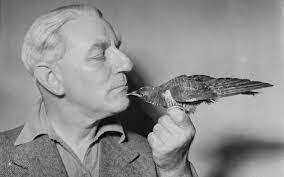
A couple of weeks ago I had the interesting experience of sharing an online stage with the renowned expert on espionage Nigel West (who also published a couple of crime novels drawing on his experience as an MP under his real name, Rupert Allason). Listening to Nigel prompted me to delve into a book published five years ago by Henry Hemming, a biography of the legendary spymaster Maxwell Knight.
I knew a bit about Knight from my researches into the life and work of John Bingham, who was one of his agents - as was John le Carre. Another of his agents was Bill Younger, whose The Hammersmith Maggot I discussed on Friday. Yet another was Jimmy Dickson, who wrote as Grierson Dickson (confusion in the past caused some people to think that John Dickson Carr was one of the spies, but the person in question was Jimmy Dickson, an author of much less renown). One of the many interesting points that Hemming makes is that Knight seems to have liked to recruit authors as spies. He also had a prejudice in favour of female spies, since he prized their observational skills.
M: Maxwell Knight, MI5's Greatest Spymaster is a book I enjoyed reading. He was an extraordinary character, with an obsession about pets that made him famous in later life. I have a copy of his book Talking Birds, which was amusingly illustrated by David Cornwell - alias John le Carre. He also wrote two thrillers in the 1930s, Crime Cargo and Gunman's Holiday, the first of which was dedicated to Dennis Wheatley. I've never come across them, but Hemming doesn't think much of the first and doesn't even mention the title of the second.
Knight's private life was unorthodox. He married three times but seems to have had little or no interest in sex - unlike quite a few of his agents. His first wife took her own life. He flirted with fascism as a young man - one of his pals was William Joyce - but was responsible for its defeat in Britain in the early stages of the Second World War. Hemming gives a good, rounded portrait of this mysterious fellow and does so in a very readable manner.
February 18, 2022
Forgotten Book - The Hammersmith Maggot aka Shadow of a Killer
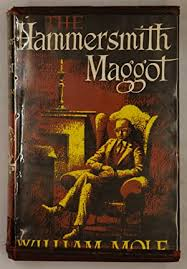
I can vividly recall where and when I first read William Mole's 1955 novel The Hammersmith Maggot. It was more than thirty years ago. I took the green Penguin edition with me when I stayed in a hotel in Hull one wintry night. I was due to conduct a tribunal case the following day, acting for a client who had been sacked simply for being pregnant because the employers thought they could exploit a loophole in the Sex Discrimination Act. It was a test case and after I'd spent a long time preparing for the morning, I relaxed by whizzing through the novel.
I'd heard one or two good things about it, but I was disappointed by the low-key nature of the storytelling and by the absence of a dramatic plot twist. With hindsight, I'd have been better taking a very different book with me. However, I came across a nicely inscribed first edition and decided to give it another try. Lo and behold! I liked it much better this time, partly because I had a clearer understanding of what the author was trying to do.
The author's real name was William Younger, and by profession he was a spy. He worked for the legendary Maxwell Knight and John Bingham was a colleague and friend. He wrote two or three thrillers, but this was the first of three novels to feature a wealthy wine merchant called Alistair Casson Duker. In this book he hunts down a conscience-less blackmailer (the 'maggot' of the British title of the book; the American title is much less memorable). The bad guy's identity is revealed at a relatively early stage, as is his motivation, but this time my attention was held.
The story is certainly out of the ordinary, and Francis Iles admired it, as did the often acerbic Barzun and Taylor. In more recent times, John Norris heaped praise on the book. Interestingly, a female blogger, Karyn Reeves, took a very different view. After two readings, I find myself rather in the middle. Mole (also a poet) could write well but there are traces of amateurishness in his sudden shifts of viewpoint. I don't think he thought deeply enough about how to present the character of the blackmailer or how to structure the story. But it's an interesting and unusual piece of work. As for that tribunal case, justice was done - and when the bad guys appealed, they got their come-uppance!
February 16, 2022
Passengers - 2008 film review
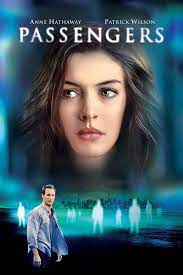
Passengers, the 2008 film not to be confused with the 2016 sci-fi film with the same title, is sometimes described as a 'romantic mystery thriller'. I was lured into watching it by the presence in the cast of Anne Hathaway, a terrific actor, coupled with the promise of mystery and thrills. And this film by Rodrigo Garcia is certainly well-made. But it's lacking in a number of respects.
Hathaway plays Claire Summers, a psychotherapist tasked with counselling a small group of passengers who were involved in a plane crash (there's a scene on board the plane at the start of the film). One of them, Eric (Patrick Wilson) is rather euphoric, and seems to know more about Claire than he should, for example concerning her estrangement from her sister. Recollections within the group vary about what happened immediately before the crash - was there an explosion?
The plot seems to thicken when Claire discusses matters with a man called Arkin, who is an airline official of unspecified seniority and who starts to behave rather suspiciously. He claims that the reason for the crash was pilot error. One by one, members of her group disappear, and Claire begins to worry that they are being stalked by the airline. She is increasingly attracted to Eric, but fearful that there is some kind of cover-up going on, orchestrated by the airline.
Are we in for a conspiracy thriller? At times it seems like it, but Ronnie Christensen's screenplay ultimately takes us in a different direction. I'm afraid that I found the Big Twist a Big Let-Down. This turns out to be one of those movies dependent on a particular trick which has been used plenty of times before, but only works well, at least in my opinion, in the hands of a master. I'm afraid I found watching Passengers to be a very frustrating experience. It crashes like the plane.
February 14, 2022
Magpie Murders - Britbox TV review
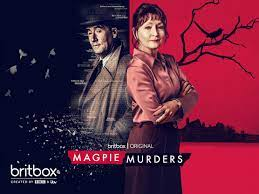
I read and enjoyed Anthony Horowitz's Magpie Murders not long after its original publication. I was even more taken with the follow-up title, Moonflower Murders, which is quite excellent. So I was looking forward to the TV version of the first book in the 'Susan Ryeland' series, anticipation enhanced when I discovered that Horowitz himself was taking responsibility for the adaptation.
I certainly wasn't disappointed. On the contrary, I enjoyed the TV version even more than the book. Although the same man wrote both versions of the story, I felt that his use of the flexibility of television worked to the story's advantage. It also helps that Horowitz is even more experienced in the field of screenplay writing than he is as a detective novelist. Here he is on the top of his game. There is a slight dipping of tension in the fifth of the six episodes, as the pieces of plot are manoeuvred around the chessboard, but everything comes together quite triumphantly in the final instalment.
Horowitz benefits from a first-rate cast and the sort of high production values that ensured the long-term success of Inspector Morse thirty-five years ago. Susan, for instance, is played by Lesley Manville, who does a very good job. Michael Maloney is also good as her publisher boss. Lately I've been watching old episodes of that great comedy series The Brittas Empire, so I was very pleased to see Pippa Haywood, who played Gordon Brittas' wife Helen, taking on not one role here but two.
The novel features a 'book within a book' but in the screenplay, the two stories are intertwined, a method that works extremely well, with some of the same actors appearing in both. It's all very clever, but because Horowitz is such a skilled craftsman, the cerebral plotting never becomes turgid. The location filming in lovely parts of Suffolk is the icing on the cake.
February 11, 2022
Forgotten Book - Traitor's Way
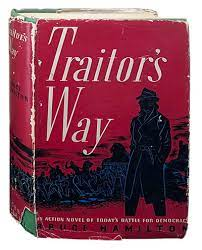
Traitor's Way by Bruce Hamilton was published in 1938 in Britain and in the US in the following year. It's a lively manhunt thriller, very much in the tradition of John Buchan's The Thirty-Nine Steps. I found it a fast and easy read, but this is a book that has hardly ever been discussed, though it receives one or two glances in books about spy fiction.
One reason for this neglect may be Bruce Hamilton's lack of celebrity. For instance, his early novels Hue and Cry and Middle-Class Murder are also elusive. But it's also true that the political premise on which he based the plot was rendered absurd shortly after the book was written and I guess publishers would think that this made a nonsense of his story.
I'll try to discuss the book without giving too much away - not an easy task. The ten chapters have short, snappy titles, such as 'Fracas' and 'Conspiracy', and this is in keeping with the writing style - this is Hamilton at his paciest. The story is told by Noel Mason, an ordinary individual, who starts out as 'an entirely non-political person' but finds himself caught up in a web of political intrigue, and a game played for very high stakes indeed.
This is an anti-Fascist novel, featuring a charismatic chap called Greatorex who leads something called the Order of British Chivalry. Not that they are at all chivalrous in practice. Poor Mason ends up committing a crime and he finds himself in Dartmoor. But when the chance to escape arises, he grabs it...
I enjoyed this story, even though it's not in the Buchan class and I felt it showed Hamilton's naivete about politics. What happens in his story is very, very different from what actually happened in the world a year or two later. He wasn't much of a crystal ball gazer. But at his best, he could tell a good story.
February 9, 2022
The Invitation - 2015 film review

The Invitation is a 2015 horror film directed by Karyn Kusama which earned a certain amount of critical acclaim. I have mixed feelings about it, but it's intriguing and - in some respects - unpredictable. At the start, Will and his girlfriend Kira are driving to a dinner party in the Hollywood Hills when they run over a coyote. Will kills the luckless animal to put it out of its misery, and I thought this was a rather clumsy piece of foreshadowing. But the film develops momentum once they arrive at the party.
They have been invited to the party by Will's ex-wife Eden and her new husband David. A number of other friends have also been invited; it's the first time they have seen Eden and David for a couple of years. It emerges that Will and Eden previously experienced tragedy: the death of their young son. And the atmosphere at the party is distinctly unsettling.
The other guests include a strange woman called Sadie and a man known as Pruitt. Will becomes unsettled, especially when David locks everyone inside the house. A video featuring a dying woman receiving comfort is shown and this upsets another guest, Claire, who decides to leave. When Pruitt follows her out, Will's unease increases.
The tension is built up skilfully, but I thought it dissipated in the later stages of the film as subtlety is abandoned and the body count rises. The final scene has attracted much comment, and quite a lot of admiration, but it didn't work for me; to explain why would be a spoiler. There are some interesting ideas in this film, but for me the storyline was not so much pleasingly ambiguous as - in some respects - verging on incoherence. The fact that there were so many guests at the party meant that the characters weren't fully developed, and as a result I didn't care about their fate as much I should have done. Not bad, but no masterpiece.
February 7, 2022
Blackstone Fell

I'm delighted with the gorgeous cover that Ed Bettison has designed for my next Rachel Savernake novel, Blackstone Fell, which will be published in the UK by Head of Zeus in September. Ed was responsible for the covers of Gallows Court and Mortmain Hall, and there is a clear brand identity for the series now which appeals to me and, I hope, appeals to a lot of readers. The covers certainly seem to have contributed to sales growth over the past couple of years, and there is no doubt that Ed is very talented.
The central concept of Blackstone Fell came to me during 2020, when - after the easing of the first lockdown - I went on a trip to Hardcastle Crags, a National Trust site in Yorkshire and had a great day in a marvellous and evocative setting. It seemed to suit adaptation and the fictitious village of Blackstone Fell was the result. The village incorporates a dangerous stretch of water inspired by Bolton Strid, as well as a spooky tower which was largely the product of my imagination, but drew on a number of monuments in the real world.
At the time I was thinking about the book, I'd been watching again the complete run of episodes of David Renwick's Jonathan Creek, as well as working on John Dickson Carr titles for the British Library. So I decided it would be fun to have a genuine locked room mystery in the book - but as a sub-plot rather than the mainspring of the story. I've written locked room mysteries in the short story form but this is the first time I've incorporated one into a novel.
I won't say too much about the main plot-line since, as with Mortmain Hall, I've tried to disguise the nature of the over-arching puzzle. But suffice to say that this is a novel which offers all manner of Golden Age ingredients, including a sanatorium, a village pub, a church with a dodgy vicar - and a seance. Oh, and a cluefinder....
I'm really looking forward to publication and I hope that the cover artwork, at least, will whet the appetites of readers!



